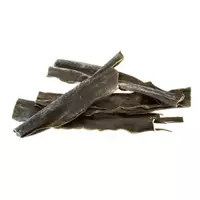Algae kombu

Kombu is a species of edible kelp that is common in Southeast Asia. By the way, more than 90 percent of Japanese kombu algae is artificially grown in Hokkaido, although there are several large farms in the inland Sea of Japan.
In the culinary arts of the East, kombu seaweed is a very popular ingredient in many dishes. This algae is sold dried (in plates and in the form of chips), pickled in vinegar, as well as fresh in sasimi. Such unusual food for us as dasi is not complete without kombu, for the preparation of which this type of seaweed is ground into powder before being added to the dish. Another way can be used - soften strips of kombu algae in hot water, and then boil soft algae in soy sauce, adding mirin. As a result, you will be able to enjoy another famous Asian dish - tsukudani.
If you cut the algae into 5 by 2 centimeters strips, then leave it in a sweet and sour marinade for a while, this algae can be used as a snack for green tea. Very often, using algae, kombu is seasoned with sushi rice and added to dishes using legumes to increase their nutritional content. By the way, in Russia, the kombucha drink, which has become quite popular recently, is called kombutya, and it is prepared on the basis of the same kombu, only in the form of powder.
From the point of view of benefits for the body and, accordingly, human health, algae combu is not only an excellent source of iodine, which has such a beneficial effect on the state of the thyroid gland, but also the owner of glutamic acid. This amino acid has the ability to enhance the taste of dishes that include komba, but unlike the artificial food additive popular today, it is absolutely natural.
algae kombu 77 kKal
Energy value of algae kombu (Ratio of proteins, fats, carbohydrates - ju):
Proteins: 8.3 g (~ 33 kCal)
Fats: 8.3 g (~ 75 kCal)
Carbohydrates: 10g (~ 40kCal)
Energy ratio (bj | y): 43% | 97% | 52%
 Español
Español Français
Français Português
Português Русский
Русский 简体中文
简体中文 繁體中文
繁體中文 日本語
日本語 한국어
한국어 العربية
العربية Türkçe
Türkçe Қазақ
Қазақ Deutsch
Deutsch Italiano
Italiano Українська
Українська
